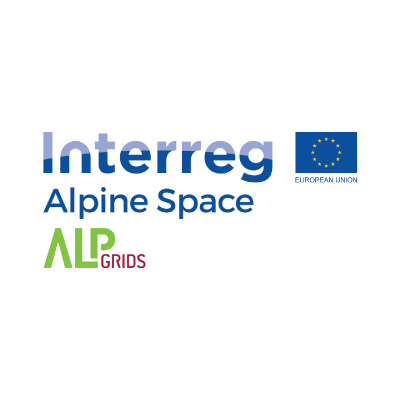Project video
Project description
Due to its topography, the Alpine Space (AS) area is characterised by many small local electric grids weakly connected to the upstream grid which are highly exposed to black-outs due to natural disasters that cut electric grid lines. In these areas a more resilient energy system is needed. On the other hand, the Alpine area has a high potential for low-carbon electricity generation from renewable sources and for local energy storage. ALPGRIDS aimed to create a transnational enabling environment as precondition for the development of microgrids by addressing regulatory issues (grid regulations, data security, energy consumer rights) and organizational-business challenges (feasibility, organizational structure). The project built on the alpine assets: biomass availability, hydropower storage, green-tech clusters, autonomous local electricity producers/distributors and energy communities.
ALPGRIDS main objective was to increase the uptake of RES in the Alps through microgrid solutions.
Key benefits of using microgrids for local communities, municipalities and energy stakeholders are mainly two-fold:
- Increase their energy autonomy: by facilitating local energy transactions: local energy consumer can purchase electricity from local RES producers directly or indirectly at an acceptable price
- Improve the resilience of electricity networks in the case of emergencies
Additional benefits may include:
- Reduction of electric losses and infrastructure costs
- Introduction of new services to the grid
Another focus of the project was the creation of a transnational enabling environment to foster microgrid solutions supporting in particular the creation of local energy communities. Transnational exchanges was implemented involving local energy stakeholders and policy makers.
In particular, ALPGRIDS focused on:
- Developing a common understanding of microgrids and their benefits
- Creating an enabling policy environment for microgrids
- Replicating the microgrid model in the AS and beyond
The project built on 6 existing pilot sites in 5 countries and took them to the next steps in order to develop the following 3 key outputs:
- an alpine microgrid model for energy communities and project developers
- a policy package for national, regional and local policy makers for instance to improve their energy and climate plans
- a replication programme involving organizations outside the consortium in relation with EUSALP AG9 on energy.
Project partner
- Auvergne-Rhône-Alpes Energy Environment Agency (Lead partner, France)
- Regional Agency for Infrastructures, building Renovation and Energy of Liguria (Italy)
- Energy and Innovation Centre of Weiz (Austria)
- Design and Management of Electrical Power Assets (Italy)
- B.A.U.M. Consult GmbH München (Germany)
- Rothmoser GmbH & Co. KG (Germany)
- Compagnie Nationale du Rhône (France)
- Municipality ofUdine (Italy)
- Municipality of Selnica ob Dravi (Slowenia)
- University of Genoa (Italy)
+ 35 Observer from different countries


